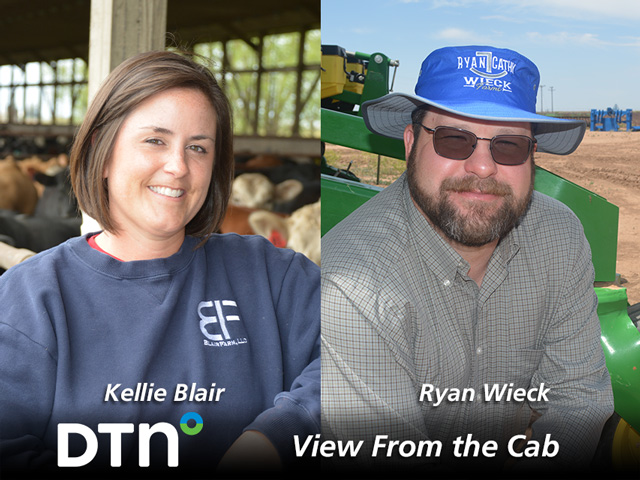View From the Cab
Farm Shopping List Shortages: From Glyphosate to Work Boots
DECATUR, Ill. (DTN) -- Ryan Wieck will tell you if the shoe fits, it can be hard to find. The Umbarger, Texas, farmer requires a size 17 foot covering, and buying them at any price has become a chore.
"It typically takes a special order, and I've been waiting over a month so far for a new pair and have been told it will be several more weeks," said Wieck. "Either more people are working and needing boots than I realized, or they haven't found a cow big enough to cover my Sasquatch foot."
Keeping shoes on his feet is not his only concern when it comes to purchasing goods these days. "Finding chemicals has become nearly impossible since we had a rain here," Wieck said. "There is zero Roundup (glyphosate) or Liberty (glufosinate) to be had."
While Kellie Blair hasn't experienced any real shortages of farm-related needs, the difficulty of getting items in this pandemic period is definitely on her radar.
"We have decided to delay building a barn that was planned because of lumber costs and the possibility of other supplies associated with it being hard to get," said Blair, who farms near Dayton, Iowa.
Blair and Wieck are participating in DTN's View from the Cab project. This weekly feature looks into crop progress, rural issues and farm life from two distinctly different agricultural regions -- this year Iowa and Texas. This is the 10th report for the year.
Weather continues to dominate the focus for both farmers this week. Blair Farm remains in a dry pocket in central Iowa. Wieck, who has been in the clutches of a two-year-long drought in the Texas Panhandle, finally got a decent rain this past week, which of course means weeds aren't far behind.
In this View From the Cab installment, the farmers discuss crop conditions, supply chain challenges and how COVID-19 concerns have frayed the fabric of rural communities.
Read more about what's happening in their worlds this week:
KELLIE BLAIR -- DAYTON, IOWA
Blair Farm is doing its part to will a rain to fall. They mowed hay last Friday and left it to dry in the field over the weekend. Out-of-town relatives have come for an extended visit. The family took a camping trip -- all things that normally would entice precipitation -- except for this year.
"The half-inch-here and half-inch-there rains we've gotten have helped, but they aren't replacing anything, and the stress is starting to show on the crops now," she reported.
P[L1] D[0x0] M[300x250] OOP[F] ADUNIT[] T[]
The farm is working on a water recycling project this summer, and ponding building started this past week. "Digging at 10 feet, they still hadn't found water. We would normally have moisture in the soil profile.
"I even wonder about those areas that got big rains and had flooding. A lot of those rains may have runoff after having such dry environments," she added.
Plant tissue testing was on the work schedule for this week. The farm is participating in a study where samples are drawn from the leaf and soil in the same area over time. "This is our first year for working with an agronomist on that, and I think it will take time to build enough data points for it to be meaningful," she said. Meanwhile, she was continuing to scout for soybean aphids and, with the hot/dry conditions, knows that spider mites could become an issue.
She's grateful that with the exception of rain, they've not needed much in the way of inputs or equipment so far this year. "We know that glyphosate is difficult to come by. You can tell by looking at equipment and auto dealerships that inventories are really low.
"The situation is causing us to think ahead more on products we might need. We'd gotten used to going hand-to-mouth, and it's hard to count on having something quickly right now," she said. At the same time, Blair said they are also trying to instill patience into their thinking.
"Just because we got used to Amazon two-day shipping doesn't mean we can't live without some things," she noted.
The farm has started down the path to selling more beef direct to the customer. She's also working on entry into grocery stores. "That takes a different level of inspection, and what I've noticed is how difficult it is to get people to answer calls or to find real people to assist with the process," she said.
COVID changed the climate in her rural community, but most activities are returning, she noted. Blair had COVID in 2020. She recovered from the illness, but she has noticed some of her favorite foods still don't taste right. She and her husband, AJ, made the decision to take advantage of the vaccine when it became available.
"When we put animals into a barn, we vaccinate them so their bodies can naturally fend off stress and disease. So, we feel comfortable with the process and felt it was a good choice for us," she said.
Still, she doesn't feel quite back in the pre-COVID groove. When the kids had a night scheduled at the grandparents this week, Blair admits she felt flummoxed when AJ suddenly suggested a date night. "I realized I've forgotten how to go out and just do ordinary things," she said.
RYAN WIECK -- UMBARGER, TEXAS
To say that COVID is controversial may be an understatement, Wieck agreed. He's certainly not going to deny it is a serious problem. He also endured COVID last year.
"My case was fairly light, and I didn't have long-term health consequences, so I've waited on receiving the vaccine. Other members of my family who are more at risk have gotten vaccinated, and that was the right option for them," he said.
Wieck said his rural community mostly remained open, even at the height of the pandemic. Still, he watched the pressures of the strange time test friendships, split families and divide communities. "There seems to be this sentiment that others want you to respect their opinion, but don't care about yours. The world needs a big shot of kindness and patience right now," Wieck said.
Whether the shortages of farm inputs he's facing now are pandemic related doesn't matter as much as figuring out how to respond to the situation, Wieck noted. He's already ordered plastic wrap for the newly purchased cotton stripper baler and hopes it shows up in time for harvest.
Recent rains have a crop of weeds coming in wheat stubble that requires herbicides that are proving difficult to obtain. "Certain chemicals are really hard to come by, such as glyphosate, glufosinate and acephate insecticide. You might find some at one retailer and not another, or if you do find it, there are wide swings in prices," he noted.
"We may be forced to look at tillage as an option on some wheat stubble to control weeds if we can't find enough herbicide. That stubble does an important job as a cover to retain moisture. However, letting a weed crop go to seed has long-term consequences too," he said.
Wieck is also concerned that neighboring farmers facing herbicide shortages might move to spraying 2,4-D in wheat fields. That is a concern for his cotton, which is sensitive to 2,4-D. He planted Xtend Flex cotton varieties, which tolerate dicamba, glyphosate and glufosinate.
The area he farms between Umbarger and Dawn received the first really good rain since September 2019. Between 0.88 inch and 2 inches fell across his entire acreage on July 2.
"We were in the doughnut hole for a long time. And, finally, the doughnut hole filled in a little bit. It was really the perfect rain -- no bad weather, no bad winds. Go a little west, a little east or a little south of us, and they had hard rains that caused damage," Wieck said.
Cotton fleahoppers are the other shoe waiting to drop this week. These pests of early squaring cotton cause square (flower bud) loss, which affects crop yield and quality. "Fleahoppers eat the squares in the area of the plant that produces what we call our 'money bolls' -- those lower on the plant that are the first squares to set up and most productive," he explained.
"Between fleahoppers and weeds, I've got about 3,000 acres to get sprayed as soon as possible. In other words, we now need good spray days," he said.
Pamela Smith can be reached at pamela.smith@dtn.com
Follow her on Twitter @PamSmithDTN
(c) Copyright 2021 DTN, LLC. All rights reserved.



